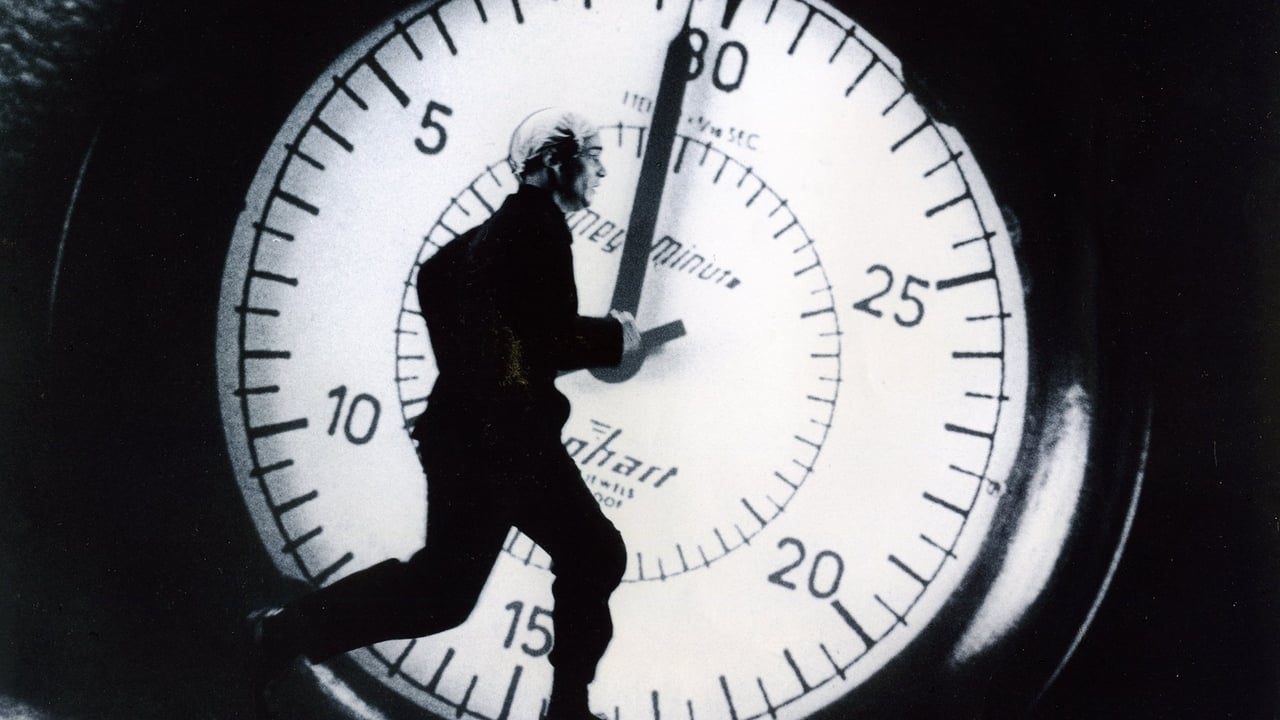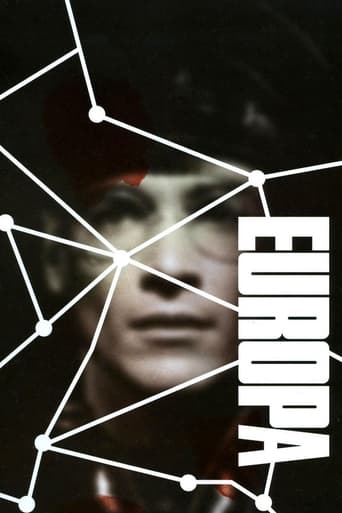

Really Surprised!
... View MoreDid you people see the same film I saw?
... View MoreOk... Let's be honest. It cannot be the best movie but is quite enjoyable. The movie has the potential to develop a great plot for future movies
... View MoreMostly, the movie is committed to the value of a good time.
... View MoreLars von Trier's portrayal of post-war Germany is an exercise in visual beauty. Think of the infamous Danish "agent provocateur" what you will - his films certainly never fail to leave a lasting impression. This one is perhaps his most accessible effort to date. 8 stars out of 10.In case you're interested in more underrated masterpieces, here's some of my favorites:imdb.com/list/ls070242495
... View More"You will now listen to my voice. My voice will help you, and guide you still deeper into Europa. Every time you hear my voice, with every word and every number, you will enter a still deeper layer, open, relaxed and receptive. I shall now count from one to ten. On the count of ten, you will be in Europa. I say; One, and as you focus your attention entirely on my voice you will slowly begin to relax. Two, your hands and your fingers are getting warmer and heavier. Three, the warmth is spreading through your arms, to your shoulders and your neck. Four, your feet and your legs feel heavier. Five, the warmth is spreading to the whole of your body. On six I want you to go deeper. I say; Six, and the whole of your relaxed body is beginning to sink. Seven, you go deeper and deeper and deeper. Eight, on every breath you take, you go deeper. Nine, you are floating. On the mental count of ten, you will be in Europa. Be there at ten. I say; Ten."And on the narrators command we are transported into Europa; Lars von Trier's dark and brooding film noir masterpiece that deals with themes of guilt and manipulation in post-war Germany. The protagonist is Leopold Kessler, an idealistic American of German descent who has come to Germany to work with his uncle as a first-class sleeping-car conductor. There he meets and is seduced by a strikingly beautiful young woman named Katharina, whose father owns the rail company Leopold now works for. As he is drawn into Katharina's world he encounters the problems Germany is trying to face; a sense of national guilt over their countries actions during the war, a dark depression settling on Germany's national psyche and the realities of living in an occupied and defeated country. The occupiers, meanwhile, concern themselves with administering tests to determine German citizens culpability in Nazi actions during the war, and dealing with the insurgence threat of the Werewolf (a group of commandos and Nazi sympathisers set on sabotaging Allied interests). But as Germany faces it's past, so must Katharina, admitting to the now smitten Leopold that she used to be a member of the dreaded Werewolf group.In a way, the story is almost incidental in the face of the spectacle of Europa. The plot is a standard thriller affair wrapped in allegory, with characters, music and cinematography so deeply recalling film noir that you have to wonder whether von Trier is offering up a pastiche or a homage, but it's through his wonderful cinematic technique that Europa becomes something truly unique. Using all sorts of visual trickery such as double exposure, superimposition, aft and foreground projection, highly-choreographed, Hitchcock-like camera movements and splashes of unexpected colour in the deep and oppressive high-contrast black and white world of Europa (a technique Spielberg would later ape to widespread acclaim in Schindler's List), von Trier presents a composite image that shows the films larger themes. Through the hypnotic presence of Max von Sydow's narrator who commands Leopold on his journey, the clever use of colour and interleaved images, the familiar plot and noir sensibilities, the way the occupying US forces manipulate the situation for their own gain and the way Katharina manipulates Leopold, the viewer is in turn expertly manipulated and taken along for the ride. The plot offers no surprises, everything is foreshadowed and hinted at via one method or another, but through von Trier's manipulation the scenes remarkably lose none of their impact. Undoubtedly Europa is a cinematic masterpiece, but more for von Trier's technique and than anything else.
... View MoreReleased as Zentropa in North America to avoid confusion with Agniezska Holland's own Holocaust film Europa Europa, this third theatrical feature by a filmmaker who never ceases to surprise, inspire or downright shock is a bizarre, nostalgic, elaborate film about a naive American in Germany shortly following the end of WWII. The American, named Leo, doesn't fully get what he's doing there. He has come to take part in fixing up the country since, in his mind, it's about time Germany was shown some charity. No matter how that sounds, he is not a Nazi sympathizer or so much as especially pro-German, merely mixed up. His uncle, who works on the railroad, gets Leo a job as a helmsman on a sleeping car, and he is increasingly enmeshed in a vortex of 1945 Germany's horrors and enigmas.This progression starts when Leo, played rather memorably by the calm yet restless actor Jean-Marc Barr, meets a sultry heiress on the train played by Barbara Sukowa, an actress with gentility on the surface but internal vigor. She seduces him and then takes him home to meet her family, which owns the company which manufactures the trains. These were the precise trains that took Jews to their deaths during the war, but now they run a drab day-to-day timetable, and the woman's Uncle Kessler postures as another one of those good Germans who were just doing their jobs. There is also Udo Kier, the tremendous actor who blew me away in Von Trier's shocking second film Epidemic, though here he is mere scenery.Another guest at the house is Eddie Constantine, an actor with a quiet strength, playing a somber American intelligence man. He can confirm that Uncle Kessler was a war criminal, though it is all completely baffling to Leo. Americans have been characterized as gullible rubes out of their element for decades, but little have they been more blithely unconcerned than Leo, who goes back to his job on what gradually looks like his own customized death train.The story is told in a purposely uncoordinated manner by the film's Danish director, Lars Von Trier, whose anchor is in the film's breathtaking editing and cinematography. He shoots in black and white and color, he uses double-exposures, optical effects and trick photography, having actors interact with rear-projected footage, he places his characters inside a richly shaded visceral world so that they sometimes feel like insects, caught between glass for our more precise survey.This Grand Jury Prize-winning surrealist work is allegorical, but maybe in a distinct tone for every viewer. I interpret it as a film about the last legs of Nazism, symbolized by the train, and the ethical accountability of Americans and others who appeared too late to salvage the martyrs of these trains and the camps where they distributed their condemned shiploads. During the time frame of the movie, and the Nazi state, and such significance to the train, are dead, but like decapitated chickens they persist in jolting through their reflexes.The characters, music, dialogue, and plot are deliberately hammy and almost satirically procured from film noir conventions. The most entrancing points in the movie are the entirely cinematographic ones. Two trains halting back and forth, Barr on one and Sukowa on another. An underwater shot of proliferating blood. An uncommonly expressive sequence on what it must be like to drown. And most metaphysically affecting of all, an anesthetic shot of train tracks, as Max von Sydow's voice allures us to hark back to Europe with him, and abandon our personal restraint.
... View MoreI cannot stay indifferent to Lars van Trier's films. I consider 'Breaking the Waves' nothing less than a masterpiece. I loved 'Dancer in the Night'. I admired the idea in 'Dogville' but the overall exercise looked to me too dry and too theatrical, less cinema. 'Europa' which I see only now was a famous film at its time, succeeded in the US the relative success of an European film and got the Oscar for the best foreign language movie, but did not survive well the time in my opinion. It is also a too much explicit and extrovert exercise in cinema art to my taste.The story has a level of ambiguity that cannot escape the viewer. Treating the period that immediately followed the second world war not in the black and white colors of victors and vanquished, of executioners and victims but as rather ambiguous times when people of both sides were fighting for survival in the aftermath of a catastrophic event that change the lives of nations and individuals forever is still a source of disputes even today, more such was novel and courageous two decades ago. Yet it is the means of expression that really do not appear fit to the task.The film seems to include a lot of quotes descending directly from the films of Hitchcock, especially his early films set in the pre-war Europe, with brave British spies fighting evil German spies on trains crossing at high speed the continent at dark. The trains were a symbol of the world and its conflicts with all their intensity and dramatism. Here the train also becomes the symbol of the first sparkles of the re-birth of Germany after war, of its might, of its obsession with order and regulation, of punctuality and civility. The characters that populate the train are far from being the classical spy stories good or bad guys. The principal character a young American of German origin coming to post-war Europe willing to be part of a process of help and reconciliation finds himself in an ambiguous world of destruction and corruption, with liberators looking more like oppressive occupiers, with the vanquished not resigned to their fate but rather willing to continue on the path of self-destruction, with love doubtfully mixed with treason.It is yet this classical film treatment that betrays the director in this case. The actions of the characters, especially of Leopold Kessler played by Jean-Marc Barr seem confused, and lack credibility. The overall cinematography seems to be not Hitchcock-like but rather from a bad imitation of Hitchcock in the late 30s. The usage of color over the black-and-white film used in the majority of the time in moments of emotional intensity is also too demonstrative. It is not that Van Trier does not master his artistic means, but he is too demonstrative, he seems to try too hard to show what a great filmmaker he is. He really is great, as he will show in some of his later films, but it will be left to the viewers to decide this alone.
... View More